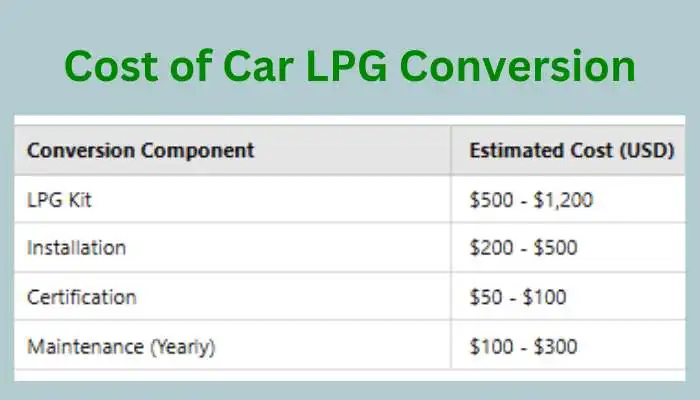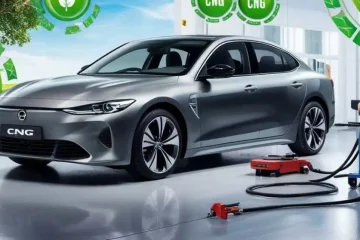Looking to convert your CNG car to LPG in 2025? Discover the cost, benefits, process, and safety measures of car LPG conversion with CNG exchange. Learn why LPG is a cost-effective and eco-friendly fuel alternative with better availability and engine efficiency. Find out everything you need to know before making the switch!
Car LPG Conversion with CNG Exchange
With the rising fuel prices and increasing environmental concerns, many vehicle owners are considering alternative fuel options. Car LPG conversion with CNG exchange in 2025 is gaining popularity due to its cost-effectiveness and eco-friendly nature. This guide will provide you with all the essential details regarding LPG conversion, the benefits, cost factors, and the process involved in switching from CNG to LPG.
What is LPG and CNG
What is LPG?
LPG (Liquefied Petroleum Gas) is a mixture of propane and butane. It is stored under pressure in liquid form and turns into gas when released for use. LPG is commonly used in vehicles, cooking, and heating appliances. It burns cleaner than petrol and diesel, producing fewer greenhouse gases, making it an eco-friendly alternative.
What is CNG?
CNG (Compressed Natural Gas) consists mainly of methane and is stored at a high pressure of around 3,000-3,600 psi. It is one of the cleanest fossil fuels available, producing lower emissions than petrol and diesel. However, CNG requires a larger storage tank, which can reduce trunk space in vehicles. Additionally, CNG fueling stations are not as widespread as LPG stations in many regions.
Why Consider Car LPG Conversion with CNG Exchange?
- Cost-Effectiveness: One of the primary reasons for switching from CNG to LPG is the cost difference. While CNG is economical, LPG often provides better mileage per liter. Since LPG operates at lower pressures than CNG, the maintenance costs for LPG systems are also lower.
- Better Availability: LPG is more widely available than CNG in many countries. While CNG stations are limited to urban areas, LPG is readily accessible in both cities and rural locations. This makes LPG a more convenient option for long-distance travelers.
- Engine Longevity: LPG is a cleaner-burning fuel, reducing carbon deposits in the engine. This leads to a longer engine life, as there is less wear and tear on the engine components compared to petrol or CNG engines.
- Higher Energy Efficiency: LPG contains a higher calorific value than CNG, meaning it produces more energy per unit of fuel. This translates to better fuel efficiency and improved vehicle performance.
- Reduced Emissions: LPG produces fewer carbon emissions compared to CNG. Since it burns at a lower temperature, it reduces nitrogen oxide emissions, contributing to cleaner air and a lower carbon footprint.
Process of Car LPG Conversion from CNG
1. Assessment of Your Vehicle: Before converting your car from CNG to LPG, you need to consult a certified mechanic to evaluate your vehicle’s compatibility. Some older models might not be suitable for LPG Vehicle Conversion due to outdated engine components or fuel systems.
2. Removal of CNG Kit: The existing CNG kit, including the high-pressure tank, regulator, and fuel injectors, must be carefully removed by professionals. Any remaining CNG in the system should be safely vented to prevent accidents.
3. Installation of LPG Kit: A new LPG conversion kit is installed, which includes:
- LPG Tank – Usually placed in the trunk, it stores LPG in liquid form.
- Fuel Injectors & Vaporizer – Converts LPG from liquid to gas before it reaches the engine.
- Electronic Control Unit (ECU) – Regulates the fuel-air mixture to ensure efficient combustion.
- Safety Valves & Pressure Regulators – Prevents leaks and controls gas flow.
4. Calibration and Testing: After installation, the system is calibrated to optimize fuel efficiency. A test drive is performed to monitor engine performance, fuel economy, and emissions. Any necessary adjustments are made to fine-tune the LPG system.
5. Legal Approval and Certification: Most countries require an inspection of the converted vehicle to ensure it meets safety and environmental regulations. Once approved, you will receive a certification allowing you to drive your LPG-fueled vehicle legally.
Cost of Car LPG Conversion in 2025
The cost of converting a car from CNG to LPG varies based on the vehicle type, kit brand, and installation charges. Here’s an estimated breakdown:
| Conversion Component | Estimated Cost (USD) |
|---|---|
| LPG Kit | $500 – $1,200 |
| Installation | $200 – $500 |
| Certification | $50 – $100 |
| Maintenance (Yearly) | $100 – $300 |

Total conversion costs typically range from $750 to $1,800, depending on the vehicle and kit quality.
Pros and Cons of LPG Conversion from CNG
Pros
- Lower fuel costs compared to petrol and diesel.
- More environmentally friendly due to lower emissions.
- Increased engine longevity due to cleaner combustion.
- Better availability of LPG compared to CNG in many regions.
Cons
- Initial conversion costs can be high.
- The slight reduction in engine power compared to petrol.
- Requires professional installation and maintenance.
Safety Measures for LPG-Converted Vehicles
- Use Certified Kits – Ensure the LPG kit meets international safety regulations.
- Regular Inspections – Conduct routine checks for leaks and proper system functioning.
- Proper Ventilation – Avoid parking in enclosed spaces if a gas leak is suspected.
- Turn Off the Engine While Refueling – Minimize risks of ignition during refueling.
- Follow Manufacturer’s Guidelines – Adhere to maintenance schedules for optimal performance.
FAQs
1. Is it worth converting my car from CNG to LPG in 2025?
Yes, if LPG is more affordable and accessible in your area, conversion can save money in the long run.
2. How long does the conversion process take?
The conversion process usually takes 1 to 2 days, depending on the vehicle and kit installation.
3. Can I switch back to CNG after conversion?
Yes, but it requires another conversion process, which involves reinstalling a CNG kit.
4. Will LPG affect my car’s performance?
LPG may slightly reduce power output, but modern kits minimize performance loss.
5. Is LPG safer than CNG?
Both LPG and CNG are safe when handled correctly. However, LPG is stored at lower pressure, reducing explosion risks.
Conclusion
Converting your car from CNG to LPG in 2025 can be a cost-effective and environmentally friendly decision. It offers improved fuel efficiency, wider availability, and longer engine life. However, ensure professional installation and regular maintenance for optimal performance. Always follow safety guidelines and legal regulations for a smooth transition. If you’re considering car LPG conversion with CNG exchange in 2025, consult experts for the best recommendations based on your vehicle type and usage.
Car LPG Conversion with CNG Exchange, Car LPG conversion, CNG to LPG exchange, LPG conversion 2025, car fuel conversion, LPG vs CNG, alternative fuel vehicles, LPG kit installation, LPG fuel efficiency, LPG conversion cost, LPG engine performance, LPG fueling stations, CNG car modification, LPG vehicle benefits, car emission reduction, CNG to LPG switch, LPG fuel savings, LPG-powered cars, eco-friendly fuel, LPG maintenance, LPG conversion process,




